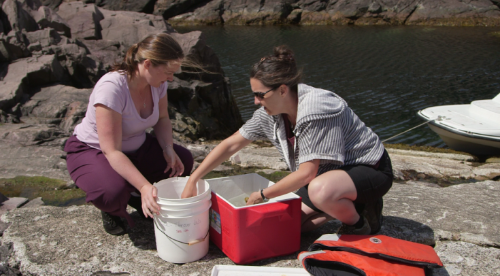Opening up oceans to province's schoolchildren
From left to right are PhD student Sandrine Baillon and Dr. Annie Mercier collect invertebrate samples in Logy Bay.
When Dr. Annie Mercier, a researcher with Memorial’s Department of Ocean Sciences, was eight or nine years old, she had the chance to hold a sea star in her hand. The moment sparked a lifelong passion for the ocean, and is part of the reason that she’s proud to be participating in a new project that will bring underwater worlds to classrooms across Newfoundland and Labrador.
The Digital Oceans Project is currently prototyping a web portal for schools that will use real-time data and video content from underwater equipment, offshore vessels and onshore sites, including Memorial’s Bonne Bay Marine Station and the Marine Institute’s Holyrood Marine Base, to allow students to participate in real-life university research. Young people will be able to ask researchers questions and watch underwater exploration happening, live. In addition, teachers will be provided with educational resources to support and enhance the experience.
Dr. Mercier will be the first researcher to head to the virtual classroom this fall.
“I’m an advocate of hands-on learning,” explained Dr. Mercier. “I believe it is more enticing for students to be exposed early on to real-life examples of prospective career interests. Alternatively, it's just a fun way to learn about the ocean.”
The project will draw on the knowledge and expertise of a range of participating researchers from various Memorial units, the Marine Institute and the Department of Fisheries and Oceans.
The Digital Oceans Project is being led by the Oceans Learning Partnership (OLP), a collaborative initiative spanning the private and public sectors with an interest in enhancing oceans education in the province as well as bridging the gap between the K-12 and post-secondary school systems. Along with Memorial University and the Marine Institute, partners include the Hebron Project, Department of Innovation, Business and Rural Development, Department of Fisheries and Aquaculture, Department of Education, Atlantic Canada Opportunities Agency, Parks Canada and educational boat tour operator Coastal Connections. The OLP has also been working very closely with K-12 science teachers, curriculum specialists and school administrators to ensure that all offerings, including the Digital Oceans Project and several other programs, are relevant and accessible for intended audiences.
Dr. Mercier believes that the program has the potential to benefit both the students who participate and Memorial as a whole.
“Having to answer simple basic questions is a great way to remain grounded in matters of interest to the general public and to the younger generation,” she said. “It’s also desirable for Memorial to have a close relationship with potential students.”
Along with its strong research and teaching and learning elements, the project is an ideal model for public engagement, showcasing everything from successful collaboration to experiential learning. As the result of a partnership that spans government, industry and academia, it demonstrates the many benefits of working together.
“We realized that a number of groups had a similar interest in strengthening oceans education in Newfoundland and Labrador, so we set out to mobilize partnerships and resources to collaborate on this joint programming initiative,” said Maria Giovannini, developer and director of the Digital Oceans Project and senior communications consultant for OLP.
It’s also an example of the benefit of having a cohesive strategic plan for Memorial’s public engagement activities. As Danielle Nichols, the Department of Ocean Sciences’s public education program at Memorial and the university’s lead on the Digital Oceans Project, explains, she and her partners were able to leverage Memorial’s Public Engagement Framework to help build internal support for the project. With clear objectives related to public engagement, Ms. Nichols and her team easily demonstrated how the project, and partnership, would help her department meet its public engagement priorities.
“We think this project will be a great learning opportunity for the Department of Ocean Sciences, and maybe even others -- it’s a prototype for collaborative public engagement projects.”
